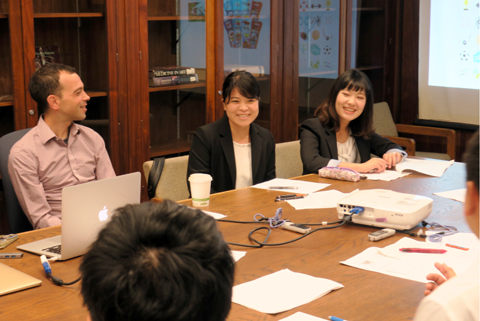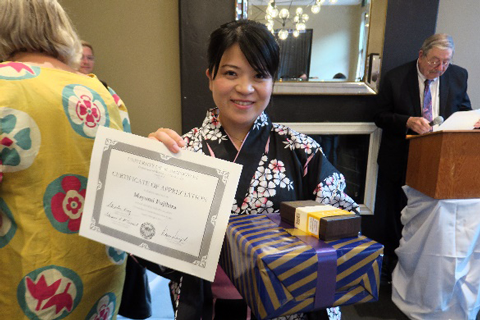国際・国内交流
藤平 真弓さん(第5学年次)
ワシントン大学研修に参加して
今回、私は8月4日から11日の8日間にわたって、シアトル・ワシントン大学医学部での生命倫理プログラムに参加させていただきました。私がこの研修に参加したかった理由は、尊厳死法を世界に先駆けて導入した州で、その実情や問題、実際に関わった医師の生の話を聞いてみたかったからです。ワシントン大学での講義はどれもその道のプロフェッショナルの方々が講師になって下さり、尊厳死法の講義はもちろんのこと、その他もとても興味深く勉強になるものばかりでした。その中でも特に印象に残ったもの3つについて報告させていただきます。
まず1つ目はSpiritual care についてです。Spirituality という言葉は日本ではあまりなじみが無く適当な単語は見つかりませんが、今回の研修での様々な講義を通して考えた自分なりの解釈は、Spirituality とはその人の人格や精神、心をつくり上げている根源になっているもので、それによってその人の人生の意味や希望、安らぎなどが見出されるものであるということです。なぜ医療においてSpirituality が大切なのかというと、それを知ることによって何がその患者の苦痛の軽減やQOL向上に寄与するのかということを知り、手助けすることが出来るからです。Spiritual care では患者のSpirituality を知り、時には患者と共に考え、患者自身が気付かなかった深層心理をも引き出すことで、本当に必要な治療やサポートを選択することが出来ます。自分が死に直面した時、どう捉え、何を大切にして余命を過ごせばいいのかを上手く考えられない人はとても多く、そのままでは精神の苦痛に対処できずに死を迎えてしまう可能性もあります。そのため、米国ではSpiritual careを専門に行うチャップレンという職業を設けており、知識を持った専門家が患者のSpiritualityと向き合いサポートができる体制になっています。また、病院と連携することでなるべく患者の漏れが無くなるような対策も行っているとのことでした。日本でも、コメディカルがSpiritual careを行っていたり、類似する組織も僅かながら存在するということですが、残念ながら全ての患者にサポートが行き渡っているというわけではありません。また、Spiritual careはこれから死にゆく患者だけでなく、全ての患者の治療にも有益です。そのため、今まず自分に何が出来るかを考えると、これから出会う患者さんのSpiritualityに目を向け、感じ、大切にしながら実習を行っていく事なのではないかと思いました。
2つ目は尊厳死についてです。ワシントン州の尊厳死法では一定の条件を満たせば、医師によって処方される致死量の薬の錠剤を患者自身が自らの手で飲むことで死ぬことが出来ます。これは医師による自殺幇助とも呼ばれる類のものですが、私はこのタイプの尊厳死があることは今まで知らず、とても興味深く学習させて頂きました。余命が短く苦痛がコントロールできない段階に来た患者は死よりも悪い日々を過ごすかもしれません。そのような中、自分の生死を自らコントロールできたら、少しは気持ちが楽になるかもしれません。それによって精神の苦痛が軽減され、患者のQOLが上昇する可能性があります。実際に、ワシントン州やその他同じ法律があるところでは、致死量の処方を受け取っても実際には服用しなかった人が存在し、持っているだけで安心するという意見があったそうです。医師の自殺幇助による尊厳死は今も議論が多く難しい項目ですが、患者の自律心を尊重し、過度な苦痛から患者を救い、QOLを向上させるひとつの手段として非常に有用であると私は思いました。また、一般的によく知られている、致死量の薬剤を医師の手によって患者に投与するタイプの安楽死において、医師の精神的負担が大きいことが大きな問題のひとつとされていますが、ワシントン州のように患者自らが服用する方法ではその精神的負担が多少なりとも軽減されるのではないかと感じました。
3つ目はFamily medicine(家庭医療)についてです。Family medicine は日本ではあまり馴染みが無く、私自身詳しくは知らなかったのですが、米国では広く普及している医療分野です。Family medicine では家族背景、社会的側面も含めた全人的診療が行われ、子供から大人、出産から終末期など全ての健康問題を対象としています。個々の専門医だけの診療では患者の全てを把握している医師がおらず、重複診療、無駄な検査、たらいまわし、見逃しなどが起こるリスクが大きくなります。一方、そこにFamily medicine があれば、患者がまず何でも相談できる窓口となり、必要であれば専門医に紹介することができます。家庭医は患者の生活や今の状態を包括的に把握しているため、その患者の最善の治療をコーディネートできる存在となります。
日本にも家庭医療を専門としている医師が少なからず活躍していますが、それ以外では大半が専門分野の開業医がかかりつけ医としてその役割を担っているのが現状です。しかし近年、家庭医に近い存在である総合診療医が専門医として認定され、教育も手厚くなってきており、今後家庭医療の役割を担う医師の数も質も向上していくと考えられます。今回米国でのFamily medicine 運用の現状を教えて頂き、将来医師になって総合医と専門領域の医師との連携が必要になる時に必ず役立てたいと思いました。今回の研修ではその他にも興味深い講義や施設ツアー、討論、そして個人的に先生方とお話しさせていただく機会もあり、非常に多くのことを考え学ぶことが出来ました。1週間みっちり様々な分野の生命倫理について考える機会を頂いたことはとても貴重な体験で、一生の宝物です。この研修で学び考え感じたことをこれからの実習や勉強に活かし、将来医師になった時に必ず役立てたいと思います。
最後になりますが、今回このような素晴らしい機会を与えてくださった山西先生をはじめ、引率してくださった関先生、蒲生先生ご夫妻、中野先生、富田先生、枚方療育園の金沢さん、梶原さん、McCormick先生をはじめとするワシントン大学の先生方、そしてこの研修で関わったすべての方に心より感謝いたします。本当にありがとうございました。

